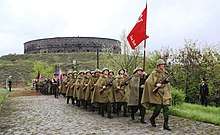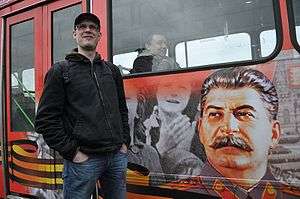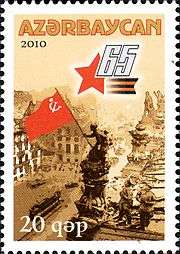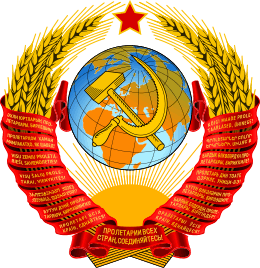Nostalgia for the Soviet Union
Nostalgia for the Soviet Union[1] (Russian: ностальгия по СССР) or Soviet nostalgia[2][3] is a social phenomenon of nostalgia for the Soviet era (1922–1991), whether for its politics, its society, its culture, or simply its aesthetics. Such nostalgia occurs among people in Russia and other post-Soviet states, as well as among persons born in the Soviet Union but long since living abroad.

.jpg)


In 2004 a television channel, Nostalgiya, its logo featuring stylized hammer-and-sickle imagery, launched in Russia.
Polling
Ever since the fall of the Soviet Union and the Socialist Bloc, annual polling by the Levada Center has shown that over 50 percent of Russia's population lamented its collapse, with the only exception to this being in the year 2012 when support for the Soviet Union dipped below 50 percent. A 2018 poll showed that 66% of Russians regretted the fall of the Soviet Union, setting a 15-year record, and the majority of these regretting opinions came from people older than 55.[4][5][6]
In Armenia, 12% of respondents said the USSR collapse did good, while 66% said it did harm. In Kyrgyzstan, 16% of respondents said the collapse of the USSR did good, while 61% said it did harm.[7] A 2012 survey commissioned by the Carnegie Endowment found 38% of Armenians concurring that their country "will always have need of a leader like Stalin".[8]
Reasons
According to polls, what is missed most about the former Soviet Union was its shared economic system, which provided a modicum of financial stability. Neoliberal economic reforms after the fall of the USSR and the Eastern Bloc resulted in harsh living standards for the general population. Policies associated with privatization allowed of the country's economy to fall in the hands of a newly established business oligarchy. The sense of belonging to a great superpower was a secondary reason for the nostalgia; many felt humiliated and betrayed by their experiences throughout the 1990s and blamed the upheaval on advisors from Western powers, especially as NATO moved closer into Russia's sphere of influence.[9]
According to Dr. Kristen Ghodsee, a researcher on post-communist Eastern Europe:
"Only by examining how the quotidian aspects of daily life were affected by great social, political and economic changes can we make sense of the desire for this collectively imagined, more egalitarian past. Nobody wants to revive 20th century totalitarianism. But nostalgia for communism has become a common language through which ordinary men and women express disappointment with the shortcomings of parliamentary democracy and neoliberal capitalism today."[10]
According to the Levada Center poll (November 2016), the people mainly miss the Soviet Union because of the destruction of the joint economic system of its 15 republics (53%); people lost the feeling of belonging to a great power (43%); mutual distrust and cruelty have increased (31%); the feeling that you are at home in any part of the USSR was lost (30%); and connection with friends, relatives lost (28%).[11] Levada Center sociologist Karina Pipiya says that economic factors played the most significant part in rising nostalgia for the USSR in the 2018 poll, as opposed to loss of prestige or national identity, noting that a strong majority of Russians "regret that there used to be more social justice and that the government worked for the people and that it was better in terms of care for citizens and paternalistic expectations."[12] A June 2019 Levada Center poll found that 59% of Russians felt that the Soviet government "took care of ordinary people". Joseph Stalin's favorability also hit record highs the spring of that year.[13]
See also
- Communism in Russia
- National Bolshevism
- Neo-Sovietism
- Neo-Stalinism
- Sovietwave, a Russian musical subgenre of synthwave
- Everlasting Summer
Communist nostalgia in Europe
- Communist nostalgia
- Ostalgie, in the former East Germany
- PRL nostalgia, in the former Polish People's Republic
- Yugo-nostalgia, in the former Yugoslavia
References
- "Why Russia Backs The Eurasian Union". Business Insider (from The Economist). August 22, 2014. "Often seen as an artefact of Vladimir Putin's nostalgia for the Soviet Union, the Eurasian Union has been largely ignored in the West."
- Nikitin, V. "Putin is exploiting the legacy of the Soviet Union to further Russia's ends in Ukraine". The Independent. March 5, 2014.
- Taylor, A. "Calls for a return to 'Stalingrad' name test the limits of Putin's Soviet nostalgia". Washington Post. June 9, 2014
- "Ностальгия по СССР". levada.ru. 2018-12-19.
- "Back to USSR: Record number of Russians regret collapse of Soviet Union". RT. 19 December 2018.
- Maza, Christina (December 19, 2018). "Russia vs. Ukraine: More Russians Want the Soviet Union and Communism Back Amid Continued Tensions". Newsweek. Retrieved December 20, 2018.
- "Former Soviet Countries See More Harm From Breakup". Gallup. Retrieved December 19, 2013.
- "Poll Finds Stalin's Popularity High Archived 20 March 2017 at the Wayback Machine". The Moscow Times. 2 March 2013.
- Why do so many people miss the Soviet Union? The Washington Post. December 21, 2016.
- "Dr. Kristen Ghodsee, Bowdoin College - Nostalgia for Communism".
- "THE FALL OF THE SOVIET UNION". Levada.ru. January 9, 2017.
- Balmforth, Tom (December 19, 2018). "Russian nostalgia for Soviet Union reaches 13-year high". Reuters. Retrieved December 23, 2018.
- "Most Russians Say Soviet Union 'Took Care of Ordinary People' – Poll". The Moscow Times. June 24, 2019. Retrieved June 25, 2019.
Further reading
- Satter, D. It Was a Long Time Ago and It Never Happened Anyway: Russia and the Communist Past. Yale University Press. New Haven, 2012. ISBN 0300111452.
- Boffa, G. "From the USSR to Russia. History of unfinished crisis. 1964—1994"
- Mydans, S. 20 Years After Soviet Fall, Some Look Back Longingly. New York Times. August 18, 2011
- Weir, F. Why nearly 60 percent of Russians 'deeply regret' the USSR's demise. The Christian Science Monitor. December 23, 2009.
- Houslohner, A. Young Russians never knew the Soviet Union, but they hope to recapture days of its empire. Washington Post. June 10, 2014
- Weir, F. Maybe the Soviets weren't so bad? Russian nostalgia for USSR on the rise. The Christian Science Monitor. January 29, 2016.
- Communist nostalgia in Eastern Europe: longing for the past. openDemocracy. November 10, 2015
- Ghodsee, Kristen R. Red Hangover: Legacies of Twentieth-Century Communism. Duke University Press, 2017. ISBN 978-0822369493.
External links
News
- Majority in former Soviet states believe breakup was harmful mistake – poll. RT. December 21, 2013.
- Blundy, A. Nostalgia for the Soviet Era Sweeps the Internet. Newsweek. July 30, 2014.
- Pippenger, N. Why Are So Many Russians Nostalgic For The USSR? New Republic. August 19, 2011.
- Most Russians regret USSR collapse, dream of its return, poll shows. RT. April 19, 2016.
- In Russia, nostalgia for Soviet Union and positive feelings about Stalin. Pew Research Center. June 29, 2017.
- Russian Support for Stalin Surges to Record High, Poll Says. Bloomberg. April 16, 2019.
Internet societies
- Project "Encyclopedia of our childhood", Soviet Union through the eyes of contemporaries
- Museum "20th century". Recollections about the Soviet epoch
- livejournal:




- Soviet cards and posters
- USSR in scale, a website commemorated to a private collection of Soviet technology and vehicles in the scale 1:43
- In Barnaul, a store called "Sovietsky" was opened (photo)
- Soviet heritage: between zoo, reservation and sanctuary (about "Soviet epoch parks") // Новая Эўропа – DELFI, 11 сентября 2013
| Wikimedia Commons has media related to Nostalgia for the Soviet Union. |
